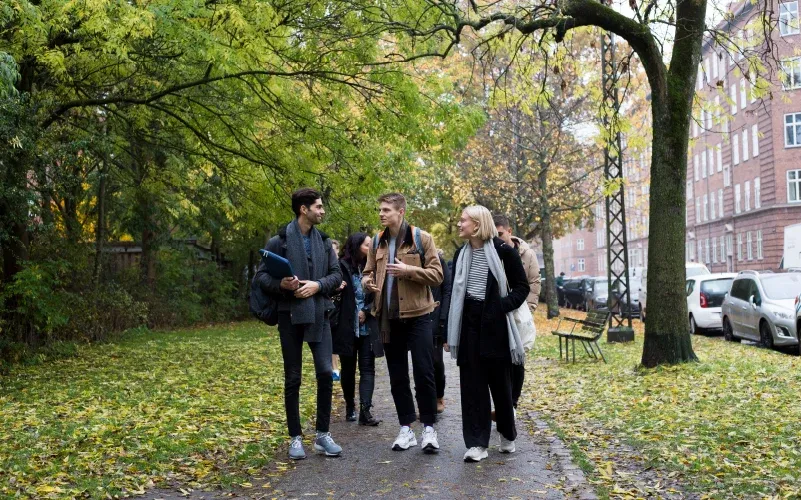Mental Health among Students
Info and tips on student life in Denmark
Karoline Denning
Karoline is a student at the University of Copenhagen and is a content creator at Excelerate. Among other things, she is responsible for the Excelerate blog, content activities, and onboarding of students and companies.
Let’s shed light upon the mental health among students. The past year definitely goes down in history in so many ways. The many hours spent in isolation have a great impact on individuals, why mental health is so crucial to discuss during this pandemic. For university students, much of the teaching has been conducted virtually and at times the universities have been closed. The same with many other parts of society due to lockdown. As a result, a lot of time is and has been spent at home sitting in front of a computer.
Thus, it has never been more important to talk about mental health among students.
Impact on Newly Admitted Students
68,718 students were admitted for further education in 2020, in Denmark. Introduction weeks for those very students have changed a lot in comparison to a pre-COVID-19 time.
Facts about student health
50% of newly admitted students in Denmark found their introduction weeks and study start insufficient.
55% of newly admitted students in Denmark state that virtual teaching makes it harder to take part in communities at the universities.
The feeling of loneliness and anxiety has increased during COVID-19 among several age groups, in Denmark and abroad.
Actually, 50% of students with a study start in 2020, in Denmark found the introduction weeks, and study start in general, insufficient and unsatisfactory. Social arrangements are severely limited. Thus, there are fewer opportunities for students to familiarize themselves with each other and get together.
And as the semesters began in the summer of 2020, a majority of the teaching was conducted online. As a result, 55% of the recently admitted students state that it was harder to take part in social communities at the universities. Although students have different preferences for learning and teaching this is reflected in the overall opinions about teaching methods. 59% of recently admitted university students prefer in-school teaching, while only 4% prefer virtual teaching, and 35% prefer a combination. When most of the teaching has been conducted virtually, these numbers are disturbing.
Loneliness among students
During the first lockdown from March till June 2020, a study with 200,000 participants, was conducted in four different European countries. The participants were all different in ages and it was found that the feeling of loneliness and anxiety was increased among many. However, the feeling of loneliness and anxiety decreased again in line with the lowering of restrictions.

Loneliness is, unfortunately, rising among students. Photo by Fausto Bottini
In addition, the tendency of loneliness was, and is, something that is prevalent among Danish students as well, and even more amongst International students in Denmark.
In short, it is shown that a lot of the virtual teaching and isolation, and everything that comes with it, has a great negative impact on many students’ mental health.
The feeling of loneliness occurs when we feel that our connections with people do not satisfy our needs and expectations. When we’re not feeling connected with the people around us or just miss being together with the people we know.
However, we’ve to remember that loneliness is not triggered by the lack of social gathering solely. Loneliness is also concerned with the feeling of feeling unwanted when you are as a matter of fact alone. Or that you feel lonely when encountering other people. Although COVID-19 has triggered a lot of these emotions, we also have to acknowledge that it also goes above that.
Furthermore, it might have been quite a struggle to do your thesis writing during this pandemic as well. Thesis writing can in itself be a lonely project if doing it alone (read: how to write a thesis alone) and with a pandemic included it might be even harder.
Anxiety can take many forms as well, one of them being that we might fear how the future looks. And in general, we might struggle with how COVID-19 is affecting our plans. Internships, studying abroad, exams… The feeling of not being in control is anxiety-triggering and disturbs the mental health of many university students.
Maintaining Your Mental Health as a student
We think it’s crucial that we talk about mental health among students and mental health in general. The feeling of loneliness is unpleasant, and it’s an issue that is slightly neglected during this pandemic. The “standing together – at a distance” might sound really tiring to you if you’re feeling down, sad and worried, and in reality, just need a big hug and comfort. A virtual hug or conversation is just not the same.

Many students are frustrated and stressed during this pandemic. Photo by Fausto Bottini
The Danish Health Authority has stated some very useful tips in order to maintain and care for your mental health. One of them being that it’s quite okay to give yourself a break from all this chaos and let go of all of your worries. You can accomplish that in several ways. Watch a good series on Netflix or start reading a new book are some of the options. Or even avoid reading the newspapers. Let’s be real, you can’t open one newspaper without being confronted with how COVID-19 affects our society. Frankly, it causes us a lot of stress, impacting amongst several things the mental health among students.
At the same time, it might also be a good idea to actually take some time off to actually worry and be sad. It could be for 30 minutes where you just take your time to worry about all the things that come to mind. If needed, write them down. Or do it once the thoughts strike you, during the day. That method can ease your worries a tiny notch, taking care of your mental health.
You Are in Fact Not Alone
Although you might feel lonely or anxious, you’re not the only one. Even if you feel that your friends or family are distanced, remember that the pandemic is possibly quite hard for them to deal with too. Everyone is struggling in one way or another, which is important to remember. It’s not just students’ mental health, which is at stake.

Go for a walk with friends. Photo by Fausto Bottini
Remember that it’s okay not being the best version of yourself at this point. However, if you do want to take care of yourself and you’ve the energy, make sure to eat well and do physical activities. Physical activity can reduce stress and mitigated forms of anxiety, improve your sleep rhythm, and even make you feel better about yourself. Also, it even stimulates your production of endorphins, which function as mood elevators. Setting time off for physical exercise a few times a week is a good investment for your body and your mental health. If you don’t have the energy to do high-intensity training just go for a walk or bike.
Remember to always listen to your gut feeling and what your body and mind tell you. And take action. Don’t hesitate to reach out to your loved ones, when feeling lonely or stressed. Hopefully, there is soon an end to all of this nonsense – take care of yourself in the meantime. Thus, we can get all you passionate students back on track.
We hope that we’ve contributed positively to the debate on mental health among students. Let’s start conversations about issues that truly matter.


